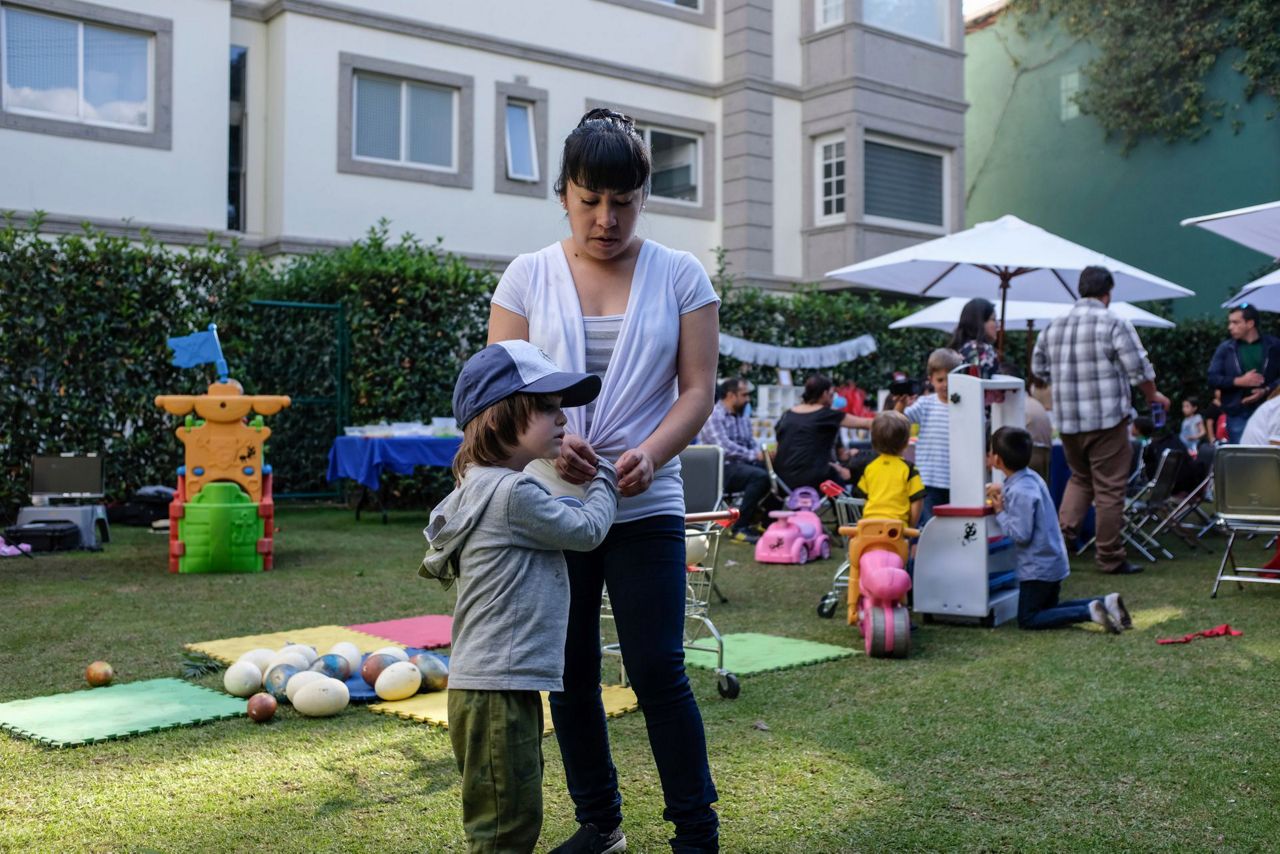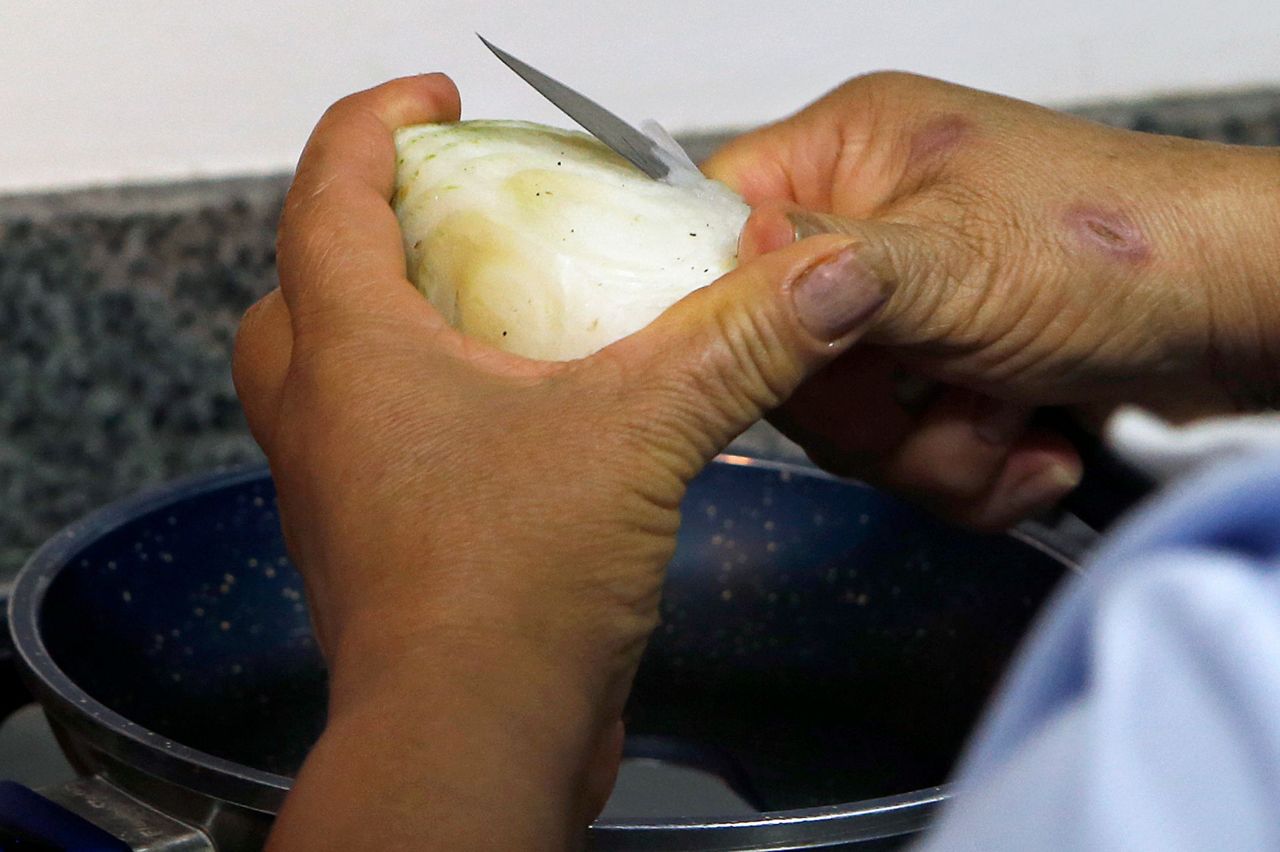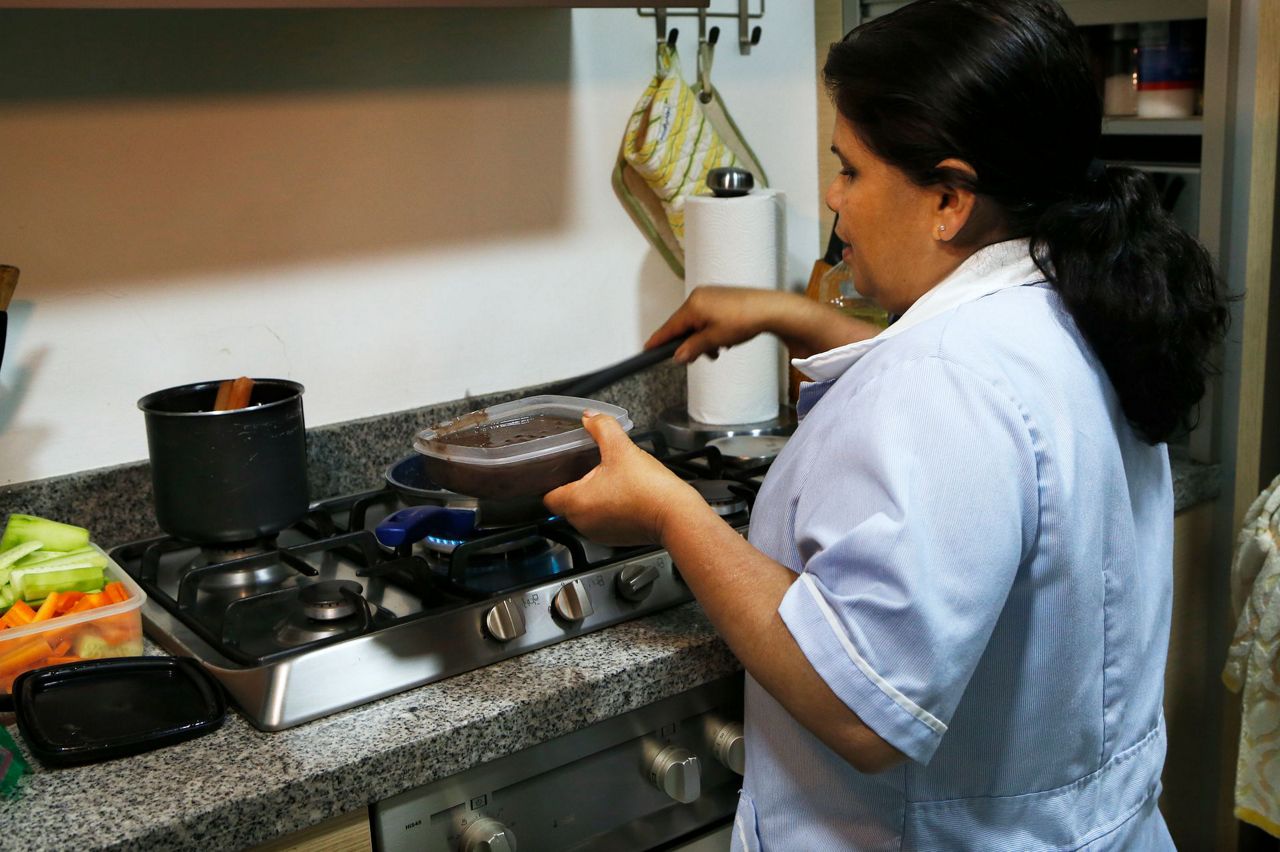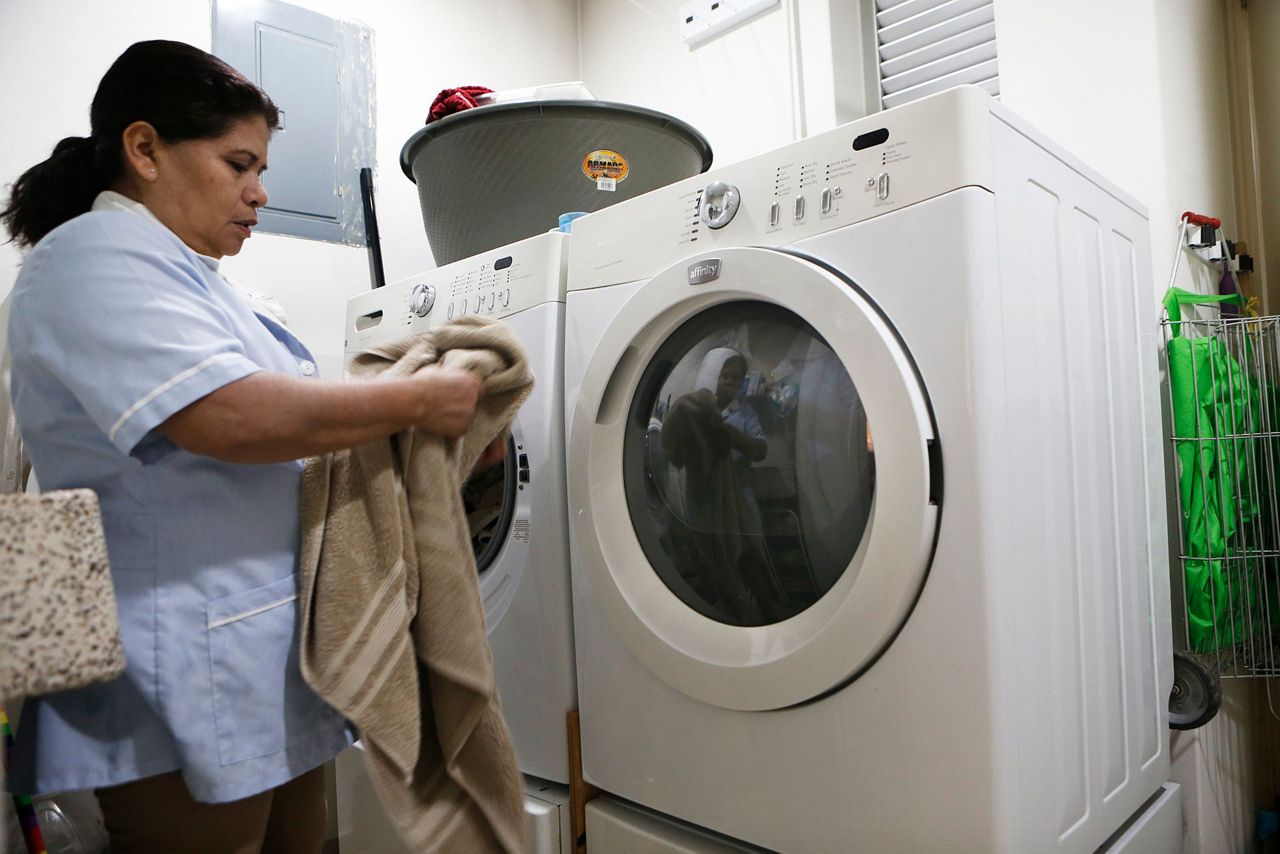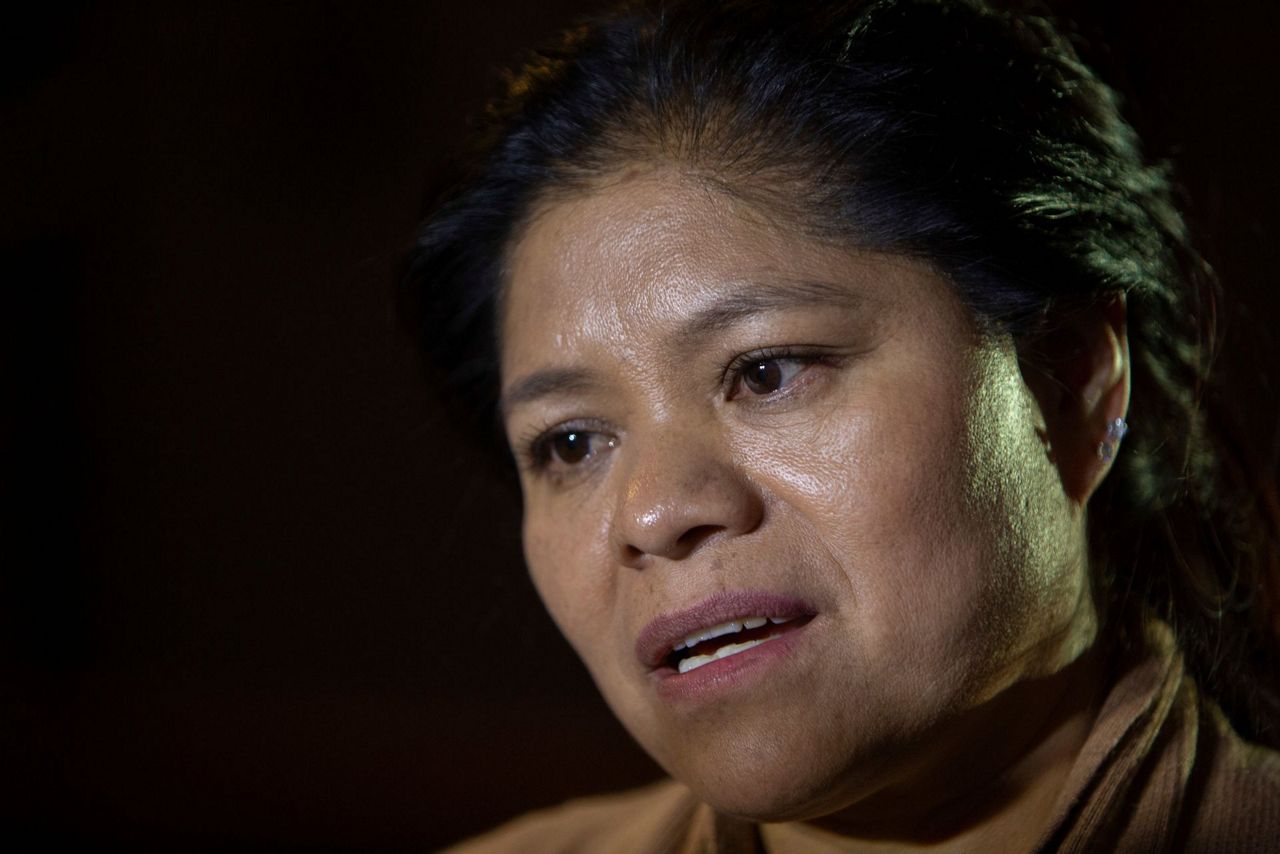MEXICO CITY (AP) — The nanny shadowed the little boy around the garden party as he traced circles on a plastic scooter, climbed a pirate ship and occasionally paused for a sip of water under the blazing sun. She didn't let him out of her sight.
It was a special day for Teo — his third birthday — and a typical weekend scene in affluent parts of Mexico. Viviana Lopez, 38, lives with Teo's family of four in Mexico City, taking every other weekend off. As she wiped Teo's nose, her own 8-year-old son was under the care of her parents in a town 2 1/2 hours from the capital.
Lopez has big plans: She wants her own house, and she is saving bit-by-bit in hopes of also opening her own beauty salon one day. She also wants a better life for her son, Jose Carlos: "I do this for him, for my little one," Lopez said during a quick break while a grandmother watched Teo.
Extended hours and low wages have long dogged Mexican domestic workers, nine out of 10 whom are women. While many go home at night, plenty more are live-in servants, commonly referred to as "muchachas" — or girls — who get four days off each month. For some, days start by making breakfast for the families they serve, dressing children for school and then washing the dishes. The work extends well past sunset and entails being on-call for late-night babysitting and house parties. To rest, they retreat to small living quarters on patios and rooftops, in laundry rooms and behind kitchens.
Now Mexican society is looking inward to examine the role that domestic help plays in the country and the working conditions for its mostly female labor force. Domestic workers are in ample supply in a country where half the population of about 125 million lives in poverty, and it's common for middle class families to employ one or more either full- or part-time. But labor laws are set to improve for the workers under new President Andres Manuel Lopez Obrador, who took office Dec. 1. And the recent Netflix movie "Roma" by Academy Award-winning director Alfonso Cuaron, portraying Mexican family life both good and bad, has broken the awkward silence around the relationships.
The Supreme Court ruled on Dec. 5 that Mexico's more than 2 million domestic workers should be enrolled in the social security system, offering them greater rights as well as access to the public health system and free, government-run daycare. That change will come with a cost to employers, plus paperwork, while possibly improving the relationship between employee and worker. The coverage should cost about $400 a year, the equivalent of a month's salary for many domestic workers.
Mexico has the lowest wages of any country in the Organization for Economic Cooperation and Development, with average monthly income per capita at $1,276. The OECD's 35 members include much of the developed world and some developing nations.
Rocio Campos left a small ranch in the Pacific state of Guerrero when she was 12 to work in a Mexico City home. Forty-three years later, she cooks, cleans, shops for groceries and washes clothes for a niece of her first employer. That niece enrolled Campos in the social security system two years ago. Now she can afford medicine for arthritis, and save money.
Campos said she wants to work as long as she can so as not to be a burden on her three grown children. As she smashed black beans for lunch in her employer's kitchen on a recent Friday, the single mother reflected on what free daycare will mean for younger domestic workers.
"You suffer the most when you go to work and don't have anyone to leave them with," she said.
The relationship between employer and employee is codependent and sometimes spans generations. Employers trust the women with what is most precious to them — children, jewelry and family heirlooms — in a country with a very weak criminal justice system. Nannies sometimes look after the children well into adulthood, caring for the children of their former charges. Domestic workers recommend cousins, sisters, aunts and mothers for work. Those recommendations are gold.
"They need our service, and we need the work," said Maria Isidra Llanos, 52, who has been cleaning homes and caring for the children of other women since she was 15. At one of her first jobs, she recalls working until midnight because the workload was so heavy. Once she became a mother, the employer let her bring the baby, which she carted around the house in a wooden crate while she ironed, cooked and mopped.
The work felt endless: "I didn't know how to put a stop to it," Llanos said.
The employer-employee relationship is often intimate, as captured in Cuaron's acclaimed "Roma," which conveys the tenderness from a caregiver who sacrifices so much of her own life for the children and household of another. The movie also shows the disregard and even cruelty that many domestic workers suffer. Cuaron dedicated "Roma" to his childhood nanny, Libo.
Marcelina Bautista, a domestic worker turned activist, said the movie has helped highlight the plight of domestic workers who are afraid to ask for better working conditions. It's also putting the topic into conversations across Mexico.
"Every time I see it I get very emotional," Bautista said, her eyes watery after a recent screening. Like the film's protagonist, Bautista came to work in a Mexico City household from Oaxaca at a young age, speaking mostly the indigenous language Mixteca. Now she runs a 1,500-strong union for domestic workers.
Cuaron rang Bautista on the phone recently to tell her to use the film as a tool, she said. And while the union is thrilled about the Supreme Court ruling on social security, its leaders are still fighting for contracts, shorter workdays and better wages.
Mexican labor law establishes a maximum 48-hour, six-day work week. But domestic workers fall into a gray area, with many putting in 12-hour days. Those who don't live in often endure daily commutes of several hours in crowded public transportation between their homes in humble exurbs and their employers' upscale residences.
From factories to offices, Mexicans work a lot. The average Mexican spends the equivalent of about 43 hours per week at work, more than in any other country in the OECD. Those long hours place heavy demands and expectations on all workers, with the biggest burden falling on those toward the bottom of the economic ladder.
Lopez has given a lot of children a lot of love in the 15 years since she started working as a nanny. Some children return that love, she says, while others don't.
"It's a great responsibility, but I find it satisfying," she said. "It's like taking care of my son — the same effort, the same care, the affection. You get attached to the children."
She said she misses Jose Carlos the most at night, when Teo and his 8-year-old sister have gone to bed, or during meals, when she wonders whether he has eaten.
Jimena Gomez , Teo's mother, said she's extremely grateful for the help with her children and she thanks Lopez daily. Gomez herself works part-time in marketing, which is when she relies most heavily on Lopez for help.
"Mexico is a country where we have always been very comfortable in having help at home always, compared with other countries, because need leads people to work in the home," Gomez said.
But she believes relationships between matriarchs and domestic workers are improving. Many moms like her are conscientious about scheduling breaks and limiting employees' workdays to eight or 10 hours. Lopez's starts well after Gomez has packed the kids' lunches and shuttled them off to school. The nanny gets paid time off and an annual year-end bonus that's standard for Mexican workers in the social security system.
Gomez said she completely supports domestic employees being enrolled in the national social security system.
"It is a job like any other," Gomez said. "They have to have health protection, retirement, like everyone. It is a very dignified job."
Copyright 2018 The Associated Press. All rights reserved. This material may not be published, broadcast, rewritten or redistributed.

